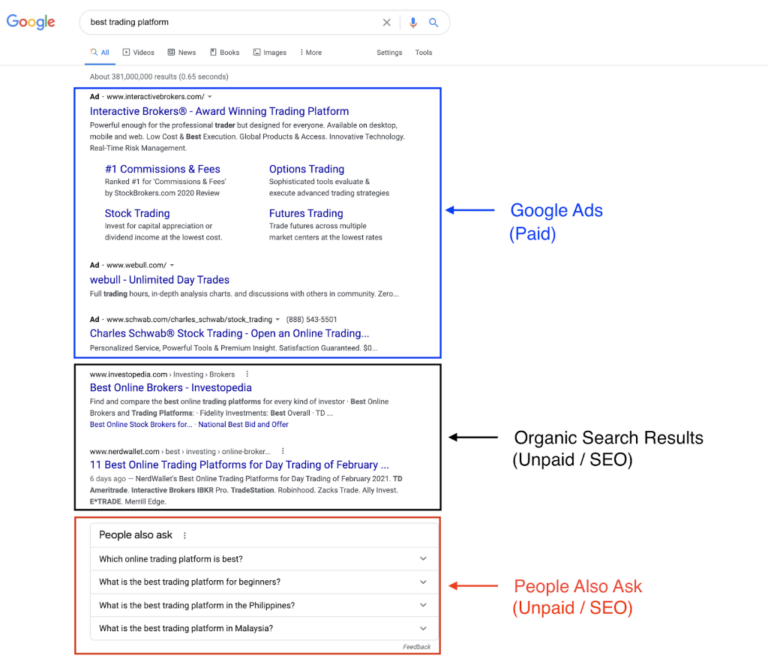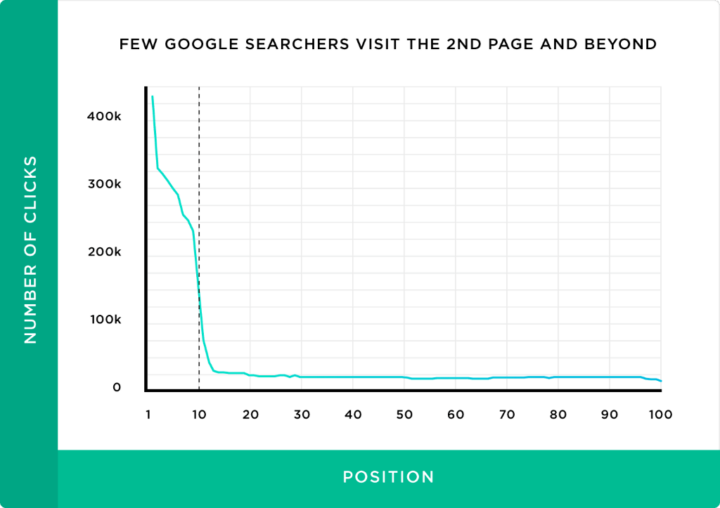SERP Domination Equals Digital Success
At its core, Fintech, Emerging Tech, and Financial Services Public Relations and integrated communications is about helping your organization be noticed, understood, and sought after. However, in the absence of online visibility, it’s impossible to generate leads, win business, or impress shareholders. So, how do we go about improving exposure? Enter the Google Search Engine Results Page (SERP). We believe that SERP domination equals digital success.
According to a recent MOZ survey, over 77% of respondents used Google 3+ times a day to search for things online. In addition, more than 90% of online experiences start with a search engine, resulting in around 3.5 billion daily searches — and that’s only on Google.
Search Engine Results Pages: What They Are and How They Work
Search engine results pages are web pages served to users when searching for something online. The user enters their search terms, known as keywords, upon which the search engine, Google, et al., provides them with a SERP. The results delivered can be influenced by a multitude of factors, including the user’s geographic location, search history, social media activity, etc.
The Anatomy of a SERP
SERPs typically contain multiple types of content, including “Organic” results (unpaid and resulting from the search engine’s algorithm) and paid results (Google Ads).

Paid Results
Paid results are displayed on behalf of a paying advertiser. Google’s primary source of income comes from paying advertisers, so it reserves prime real estate on its SERPs for those advertisements. In most cases, Google places these paid advertisements before organic results and at the top of SERPs.
Based on the results of several well-known research studies, viewers of SERPs typically look first and longest at the upper left-hand corner of their screens.

Eye Tracking SERP Heat Map (courtesy of MOZ)
Organic Results
In contrast to paid results, organic results are based upon keywords entered in combination with the search engine’s proprietary algorithm, which serves to match search results with a user’s intent. These algorithms consider variables such as domain authority, page and site-level structure, load speed, backlinks, etc.
SEO specialists’ primary goal is to understand the inner workings of these algorithms and assist their clients in optimizing their websites’ structure and content to achieve the best possible organic positioning in SERPs.
People Also Ask
“People Also Ask,” along with Featured Snippets, Knowledge Panels, and other design elements within Google’s SERPs, provide additional opportunities for businesses to get noticed and occupy SERP real estate without otherwise paying for an ad or appearing in organic search results. Appearing within these elements can typically be influenced by the strategic use of SEO techniques.
The Value of SERP Position
Positioning within SERPs is critical to the success of business online. It can mean the difference between being seen and being nearly invisible. In fact, most searchers never make it past the first page for search engine results. Per a recent MOZ study, only 7% of respondents indicated that they browse past the first results page. At the end of the day, if you’re not on the first SERP, you’re getting little to no traffic.

Graphic courtesy of Backlinko
Share of SERP
The more real estate your company occupies on the first page of a given SERP, e.g., Share of SERP, the more likely it is that searchers will visit your website. Therefore, your objective needs to be to dominate the first page of SERP results.
This leads to the burning question: How do we make that happen? Through strategic application of SEO best practices around website structure, content creation, user experience principles, and domain authority.
At Paragon, we pride ourselves on maintaining a depth of knowledge about SERPs and the skill sets necessary to help our clients get noticed online, understood, and sought after. Reach out and get in touch with us. We would love to hear your story and help you share it with the world – found more easily with a first-page search engine result!



